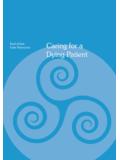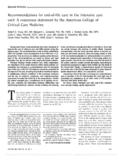Transcription of * Foreword by C. Murray Parkes * Acknowledgments …
1 On death and dying By elisabeth kubler - ross Contents: * Foreword by C. Murray Parkes * Acknowledgments * Preface Section Title Page I On the Fear of death .. II Attitudes Toward death and dying .. III First Stage: Denial and Isolation .. IV Second Stage: Anger .. V Third Stage: Bargaining .. VI Fourth Stage: Depression.
2 VII Fifth Stage: Acceptance .. VIII Hope .. IX The Patient's Family .. X Some Interviews with Terminally I'll Patients .. XI Reactions to the Seminar on death and dying .. XII Therapy with the Terminally Ill .. ========================= Foreword by C. Murray Parkes I wish I could tell people how nice it can be to die of cancer." These surprising words were spoken to me recently by a woman who died peacefully a few days later.
3 She never met Dr. kubler - ross , but I do not doubt that, had she been a patient in Billings Hospital, she would have been glad of the opportunity to talk about dying at Dr. ross 's seminar and to have attempted to exorcise the irrational fears to which doctors and clergy as well as patients and their relatives are subject. Not that it is entirely irrational to fear death . Whatever we believe is to come after death , the loss of so many of the things that we prize must be painful, and since our own death gives grief to others it is natural that we feel sad on their behalf. But the relinquishment of life is possible (particularly if, through illness, our body has lost its appetite for living), and grief can pass.
4 Those who have the privilege of caring for the person who is about to die know that the final phase of life can be a time of peaceful acceptance, a time of calm which contrasts with the tensions and frustrations of the battle for survival. "Can be"-but, too often, is not. Too many things militate against a fitting approach to death . Despite all evidence to the contrary, we insist on assuming we are immortal and assuring each other that all of us are on a space walk, immune from the laws of celestial gravity. "Don't worry," says the doctor, "it's only a little ulcer"; "Come now," says the nurse, "You mustn't talk like that, you're going to be all right." A well-rounded life should have a beginning, a middle, and an end.
5 Not just for reasons of symmetry but because, though I may be mortal, the social system of which I am a part is immortal and my arrival into and departure from that social system are important events which need to be prepared for. Medicine should not confine itself to the prevention of death any more than family planning should confine itself to the prevention of birth. But it is, perhaps, no coincidence that the century which produced (VIII) Marie Stopes and Alexander Fleming also produced Grantly Dick Reid and elisabeth kubler - ross . It seems that incipient mortality, though less easy to predict than incipient nativity, is equally a proper matter for preparation and study.
6 Dr. ross is not alone in her concern for those who are about to die. Important work has been done in Britain by Professor John Hinton and Dr. Cicely Saunders, and already two scientific journals are appearing in the United States that deal exclusively with matters pertaining to death and bereavement." France too has its "Societe de Thanatologie de la Langue Francaise", which publishes a regular Bulletin. But death (like life) is too serious a subject to be taken solemnly, and one of the most cheerful, friendly places I know is a small institution in south London which specializes in the treatment of cancer patients with a prognosis of six weeks or less.
7 Here the aim is to augment the quality rather than the quantity of the life that remains to each patient, and if there are times of sorrow and regret when patients and their families face up to the real disappointments that occur, there are also times of happiness and peace when people stop striving for unreal ends and make a good job of a real ending. In this book we shall find described the way in which some American people coped with death . Despite the cultural differences, they are very similar to people in the United Kingdom and there is no need for me to attempt to translate the clear exposition which Dr. ross has given us. Others might (and probably will) adopt a different terminology when describing the phases through which the dying patient passes in the course of his illness.
8 Since individual variation is so great, it is unlikely that any one conceptual system could be applied to all. But the overall picture, and the illustrative examples on which it is based, must stand. They stand as a reproach to some, an encouragement to others, and a lesson to all. This book is important reading for nurses, doctors, clergy, and others whose work brings them into contact with the dying . It is also recommended to any reader who refuses to believe that the best way to deal with fear is to run away. * One has the awesome title of The Journal of Thanatology and the other Omega. ========================= Acknowledgments There are too many people who have directly or indirectly contributed to this work to express my appreciation to them individually.
9 Dr. Sydney Margolin deserves the credit for having stimulated the idea of interviewing terminally ill patients in the presence of students as a meaningful learning-teaching model. The Department of Psychiatry at the University of Chicago Billings Hospital has supplied the environment and facilities to make such a seminar technically possible. Chaplains Herman Cook and Carl Nighswonger have been helpful and stimulating co-interviewers, who also have assisted in the search for patients at a time when that was immensely difficult. Wayne Rydberg and the original four students by their interest and curiosity have enabled me to overcome the initial difficulties.
10 I was also assisted by the support of the Chicago Theological Seminary staff. Reverend Renford Gaines and his wife Harriet have spent countless hours reviewing the manuscript and have maintained my faith in the worth of this kind of undertaking. Dr. C. Knight Aldrich has supported this work over the past three years. Dr. Edgar Draper and Jane Kennedy reviewed part of the manuscript. Bonita McDaniel, Janet Reshkin, and Joyce Carlson deserve thanks for the typing of the chapters. My thanks to the many patients and their families is perhaps best expressed by the publication of their communications. There are many authors who have inspired this work, and thanks should be given finally to all those who have given thought and attention to the terminally ill.








